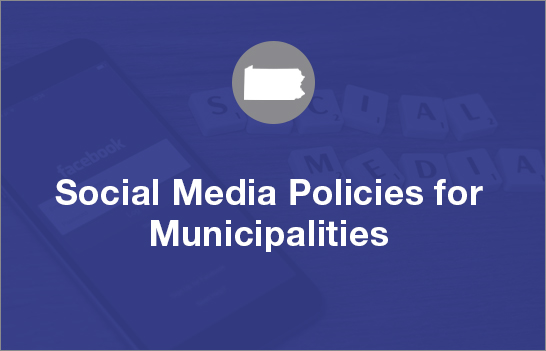It’s important for municipalities to develop policies and good, ethical habits regarding social media. While a vital tool in this age, social media expert Gina Rubel explains the importance and elements of a social media policy, the pitfalls of social media engagement, and why it’s important to educate municipal employees, elected officials, and volunteers about the policies.
Elements of a Social Media Policy
Elements of a social media policy include:
- Acceptable Use
Acceptable use policies outline a local government’s position on how employees and other officials are expected to use government resources, restrictions on use for personal interests, and consequences for violating the policy. Acceptable use may also encompass the government’s purpose in establishing and maintaining social networking sites. - Account and Content Management
Account management policies provide guidance on the creation, maintenance, and deletion of social media accounts. The lack of a clearly defined policy on account management may result in a situation where officials do not have control over what types of social media accounts are being established, maintained, or closed by their employees for official government use. - Citizen Conduct
The social media policy should identify the type of content that is not permitted on the entity’s social media site and is subject to removal. This might include comments that are profane, obscene or have violent content, discriminatory content, threats, solicitation of business, content that violates a copyright or trademark, and any content in violation of federal, state, or local law. The policy should also contain a disclaimer that any comment posted by a member of the public is not the opinion of the local government. - Employee Access
The employee access portion of the social media policy should include, if applicable, employer monitoring of employee use of government computers. The policy should also caution employees that they have no expectation of privacy while using the internet on any government-owned computer, cell phone, or other internet equipped electronic device. This portion of the social media policy may also include a requirement that the employee or official turn over any post that is subject to the Public Information Act. - Employee Conduct
1. The employment code of conduct includes three rules of engagement: Your presence in social media must be transparent through disclosure.
2. Protect your employer and yourself.
3. Use common sense and remember that professional, straightforward and appropriate communication is best. - Legal Compliance
Policies should include compliance language applicable to federal, state, and local laws; regulations and policies. It’s also important to think about intellectual property when researching and using content that you find on the internet. If you use content or images you need to make sure that proper credit is referenced. - Security
Local governments should work with their IT staff to ensure that the social media policy includes necessary guidelines regarding the security of data and technical infrastructure for new uses, users, and technologies related to social media. The technology concerns addressed in the policy may focus on password security, functionality, authentication of identity, and virus scans.
Defamation – Libel and Slander
Libel and slander are both types of defamation. Libel is an untrue defamatory statement that is made in writing. Slander is an untrue defamatory statement that is spoken orally.
The difference between defamation and slander is that a defamatory statement can be made in any medium. If you defame someone, that person may have a course of action to ensure that his or her reputation is not damaged.
Privacy
Many social media platforms allow users to set their own privacy settings, which often cover a number of areas including who viewed their profile, who can post comments and other content on the profile, and who can search for their social media page or channel. Although the vast majority of these privacy concerns apply to individual users, public sector users should be equally as conscious. Everyone who uses social media should begin with the assumption that everything posted on a government site is likely a public record.
Privacy issues involving social media are being slowly developed through case-law, and are still considered an open question subject to further explanation. Also, be aware that if a governmental entity requires people to register to use a government social networking site, it must carefully consider what information the registrant must provide (name, address, phone number, email, screen name), who will maintain the information, and whether others participating in the discussion will have access to this information.
Make it a short-term goal to create a thorough social media policy that will protect the municipality and educate municipal employees, elected officials, and volunteers. If you have any questions, please contact Gina Rubel at (215) 340-0480.
